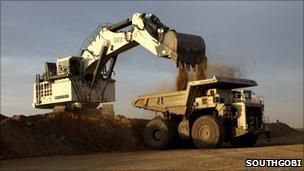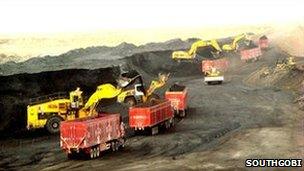Mongolia targets global mining role as investments soar
- Published

Mongolia's vast mineral resources are transforming the country into a global mining powerhouse
For centuries the Gobi Desert has been regarded as a place to avoid.
Its harsh landscape of barren plains, freezing winters and scorching summers has kept human habitation to small number of nomadic camel breeders eking out a solitary existence.
But with the recent discoveries of copper, gold and coal, the era of isolation is rapidly coming to an end.
The Gobi is now seeing a flood of geologists, miners, investors and speculators, all in search of the enormous mineral wealth lying below its desolate surface.
"Mongolia has finally arrived on the global mining scene," investment banker Bold Baatar recently told a delegation of coal mining executives attending a conference in the capital Ulan Bator.
"Over the next five to 10 years we are going to produce a world class mining industry that will rival Chile or Brazil."
Broadening horizons
Until recently, Mongolia's nascent mining industry had been based on artisanal gold mining, small-scale oil joint ventures with China and a 50-year-old copper mine built by the Soviets.
But a tidal wave of bigger deals is transforming the entire industry.
Canada-based Ivanhoe Mines is currently building a $5bn (£3bn) mine, with production set to start within 18 months.
The Oyu Tolgoi deposit has the potential to become one of the world's top three copper producing mines and could single-handedly boost Mongolia's gross domestic product (GDP) by one third.
But despite the magnitude of the deal, Oyu Tolgoi has fallen out of the headlines as the government is moving onto equally spectacular mining projects.
Teed up next is Tavan Tolgoi, a high-grade coal deposit with six billion tonnes of reserves.
The deposit is rich in coking coal, a necessary element in the production of steel, convenient for Mongolia as the world's largest steel industry lies just across the border in China.
The Chinese market is the obvious one - but in order to diversify its clients, the government is pursuing a plan to build a 1,000km (621-mile) rail link to Russia, where the coal can be sent along the Trans-Siberian railway to Far East ports, providing Mongolian coal with access to Japan, Korea and Taiwan.
And the supply chain is lining up to fill in other gaps created by Mongolia's basic infrastructure.
Power plants, coal washing plants and oil refineries are planned.

An increase in mining activity is likely to boost the Mongolian economy in the coming years
Banking, transport and service industries are all just waking up to the potential.
"Mongolia lags behind in many areas," Deputy Prime Minister Altanhuyag Norov told the conference delegates.
"But the government is striving to offer a favourable investment environment. We are reducing bureaucracy, building up mining-related infrastructure and striving to ensure transparency and international standards."
Reaping rewards
Some of the world's biggest mining companies are courting the Mongolian government to get a piece of the action at Tavan Tolgoi.
A tender process will determine which company has the right to join the state-owned Erdenes Tavan Tolgoi (ETT), which holds the mining license.
Peabody Energy, Xstrata and Vale are a few of the mining companies still in the fray.
Billions are needed to construct the mine so plans are under way to sell shares of ETT on the open market.
Average Mongolians could also reap benefits from the initial public offering of the shares as the government has promised every citizen 536 shares of common stock in the mining company.
If successful, the dividends could lift thousands of Mongolians out of abject poverty.
"There is no question that GDP will double in five years and triple in 10 years," says Bold Baatar, a one-time Wall Street banker who recently returned to Mongolia to explore new opportunities here.
Baatar predicts that in a decade per capita income could exceed $10,000, well above the current per capita GDP of about $3,200.
Road bumps
But as a developing country with entrenched graft and an inexperienced democracy, there are clear obstacles ahead.
Many fear the nation's wealth will remain in the hands of a small class of the mega-rich.
"Whether we end up as Norway or Nigeria remains an open question," says Mr Bold, referring to oil-based wealth distribution schemes developed by the Norwegian government.
The key, says Mr Bold, is to avoid rash decisions.
"It's not a slam dunk - but I think over the long term as long as we are not rushing to develop these resources, I think the country will be prosperous."
- Published6 April 2011